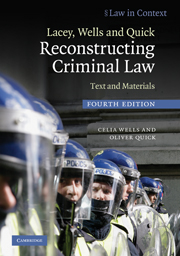Book contents
- Frontmatter
- Contents
- Preface
- Table of cases
- Table of statutes
- Section I Approaching Criminal Law
- Section II Law, Order and Security
- Section III Interpersonal Violence; Drugs and Alcohol Abuse; Offence Preparation and Participation
- Section IV Property and Propriety
- Section V Regulating Sexuality and Bodily autonomy
- 14 The Social Construction of Sexuality and Bodily Autonomy
- 15 Sexual Violence
- 16 Regulating Sexuality
- 17 Criminalising Healthcare Choices
- Section VI Making a Killing
- Bibliography
- Index
- References
15 - Sexual Violence
from Section V - Regulating Sexuality and Bodily autonomy
Published online by Cambridge University Press: 05 June 2012
- Frontmatter
- Contents
- Preface
- Table of cases
- Table of statutes
- Section I Approaching Criminal Law
- Section II Law, Order and Security
- Section III Interpersonal Violence; Drugs and Alcohol Abuse; Offence Preparation and Participation
- Section IV Property and Propriety
- Section V Regulating Sexuality and Bodily autonomy
- 14 The Social Construction of Sexuality and Bodily Autonomy
- 15 Sexual Violence
- 16 Regulating Sexuality
- 17 Criminalising Healthcare Choices
- Section VI Making a Killing
- Bibliography
- Index
- References
Summary
Sexual violence and the criminal process
Home Office 2002 Protecting the Public: Strengthening Protection Against Sex Offenders and Reforming the Law on Sexual Offences (Cmnd 5668) (HMSO) p. 9
The law on sex offences, as it stands, is archaic, incoherent and discriminatory. Much of it is contained in the Sexual Offences Act 1956, and most of that was simply a consolidation of nineteenth-century law. It does not reflect the changes in society and social attitudes that have taken place since the Act became law and it is widely considered to be inadequate and out of date.
While some piecemeal reform has taken place over the years, we have now undertaken a comprehensive review of the law so that it can meet the needs of today's society. The law on sex offences needs to set out what is unacceptable behaviour and must provide penalties that reflect the seriousness of the crimes committed. Some behaviour that should be covered by the criminal law is not at present. We know far more now about the insidious ways in which sexual abuse takes place and we have listened to the voices of victims about the profound and long-lasting effects of abuse. Our new framework of offences will plug existing gaps and seek to protect society from rape and sexual assault at one end of the spectrum and from voyeurism at the other. A special emphasis must be placed on the protection of children and the most vulnerable. […]
- Type
- Chapter
- Information
- Lacey, Wells and Quick Reconstructing Criminal LawText and Materials, pp. 489 - 539Publisher: Cambridge University PressPrint publication year: 2010



